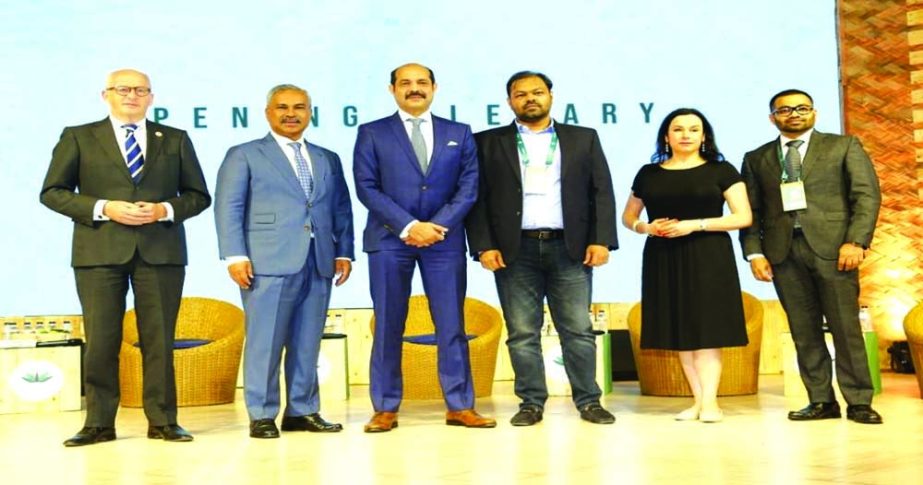
UNB, Dhaka :
Policy makers, industry leaders, brands’ representatives and fashion campaigners from home and abroad gathered in Dhaka on Tuesday to accelerate the momentum of sustainability in Bangladesh apparel industry.
More than 50 speakers as well as 20 green growth exhibitors from over 20 countries participated in the 3rd edition of Sustainable Apparel Forum (SAF) organized by Bangladesh Apparel Exchange (BAE) partnering with Bangladesh Garment Manufacturers and Exporters Association (BGMEA).
Current important apparel sustainability issues such as climate action, environmental social and governance (ESG) and green finance, purchasing practices, due diligence and legislation, and circular economy were discussed at the five plenary sessions along with opening and closing plenaries of the SAF.
Speakers of the SAF include Tipu Munshi, MP, Commerce Minister; Md. Atiqul Islam, Mayor, Dhaka North City Corporation and former president, BGMEA; Charles Whiteley, Ambassador and Head of delegation of the European Union to Bangladesh;Anne Van Leeuwen, ambassador of the Kingdom of the Netherlands to Bangladesh; Riaz Hamidullah, ambassador of Bangladesh to the Kingdom of the Netherlands; Faruque Hassan, president of BGMEA, Mohammad Hatem;executive president, BKMEA; Anna Athanasopoulou, head of unit for social economy and creative industries, European Commission;Barbara Bijelic, financial sector and regulatory engagement lead centre for responsible business conduct, OECD;Ian Cronin,community curator, platform shaping the future of advanced manufacturing and value chains, World Economic Forum; Lindita Xhaferi-Salihu, sectors engagement lead, UNFCCC; Pascal Brun, head of sustainability, H and M;Javier Santonja Olcina,regional head, Bangladesh and Pakistan, Inditex; Dr Mark Anner, founding director, Center for Global Workers’ Rights and also professor, Penn State University, USA; Ayesha Barenblat, founder and CEO, Remake;Najet Draper, vice president research, Better Buying; Gemma Verhoeven,team lead impact investments, Good Fashion Fund;Annabel Meurs, head of supply chain transformation, Fair Wear Foundation; and Tuomo Poutiainen,country director, Bangladesh, ILO.
Senior representatives from globally renowned recycling and renewable energy companies also joined as well as exhibited their sustainability and green technologies, products and solutions at the SAF. The SAF also showcased opportunities for much-needed green financing in the industry.
Founder and CEO of Bangladesh Apparel Exchange (BAE) Mostafiz Uddin said: “At this year’s SAF we have brought all the fashion stakeholders under one roof to accelerate the momentum of sustainability in Bangladesh apparel industry, especially after the Covid-19 pandemic which has had immense impact on global apparel supply chain.
This is high-level networking where it has been discussed how we can turn the needle so that the lofty sustainability goals of the industry so often talked about are translated into meaningful, practical actions, he said.
Atiqul Islam said the RMG industry of Bangladesh has been vigilant in ensuring the safety regulations, especially after the disastrous event of Rana Plaza.
He sought a collaborative approach to ensure a more ethical and sustainable industry.
Ambassador Anne Van Leeuwen said, “There has been significant improvements in the apparel industry of Bangladesh as per as safety and sustainability is concerned. However, there is still work to be done to promote sustainability in the sector for which stakeholders’ engagement and collaboration is the key.”
BGMEA President Faruque Hassan said Bangladesh has the highest number of green garment factories in the world.
“We believe that sustainability is not a sprint, it’s a marathon. We are committed to maintaining the excellence in social and environmental areas which we have already achieved, and we also focus on up-scaling our business capabilities.”
Stephanie Theirs-Ratcliffe, Director of European Brands and Retailers, Cotton Council International said sustainability is no longer an option; it is a must for the fashion industry now. “Cotton Council International is working to ensure the supply of sustainable cotton to the industry.”
BGMEA Director and managing director of Bangladesh Apparel Exchange Md. Mohiuddin Rubel said the global business landscape has been transformed to a new realism in recent years and sustainability has become the core area of concern.

